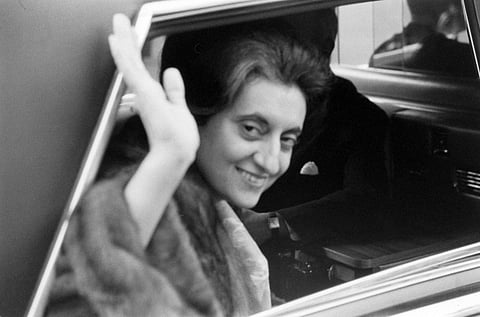25th Anniversary of Emergency Rule: India was Indira, Indira was India
Between June 1975 and January 1977, Indian democracy took an extended leave of absence. Under directions from prime minister Indira Gandhi, political opponents were jailed, human rights extinguished, news censored, and a personality cult of the Leader promoted. The "Emergency", as it is known, was once regarded as a defining moment in the history of independent India. After it was lifted, and Mrs. Gandhi dethroned, the Emergency experience was viewed as a "near miss", when India had narrowly failed to permanently join the well-subscribed ranks of the world's dictatorships. Political commentators alerted the citizenry to its lessons — not to allow bureaucrats and judges to ally with political parties, never to justify curbs on freedom of expression and, above all, to always put faith in process rather than personality.
This June marked the 25th anniversary of the declaration of national emergency by Indira Gandhi. One might have expected solemn and cautionary remembrance. Instead, recent events suggest that the Indian political class may be revising its views of the Emergency. The ruling coalition in Delhi is dominated by men who were once jailed by Mrs. Gandhi. Yet, this past January, the Government of India awarded the Padma Vibhushan — the country's second highest honour — to one man who was Cabinet Secretary during the Emergency, and to another who, as High Commissioner to the United Kingdom between 1975 and 1977, enthusiastically spread false information about the situation at home. When the person who had been Indira Gandhi's Ambassador to the United States died in March, the obituaries respectfully marked the important milestones in his career without so much as mentioning his energies spent justifying the Emergency, in Washington. Service to the state, it seems, shall ultimately be rewarded regardless of the kind of service or, indeed, the kind of state.
Perhaps the most daring re-interpretation of the Emergency comes in a just-published book (Indira Gandhi, the Emergency and Indian Democracy, OUP, New Delhi, 2000) by Mrs. Gandhi's long-serving principal secretary, P. N. Dhar. The Emergency, we may recall, was promulgated after a High Court judge in Allahabad found the prime minister guilty of "electoral malpractices". An appeal to the Supreme Court could be made, but in the interim, the prime minister would have to vacate her post in favour of some other Member of Parliament from her party. The thought was abhorrent to Mrs. Gandhi's family and advisers—and to herself as well. An emergency had to be declared.
In P. N. Dhar's account, the Emergency was not really a consequence of Indira Gandhi's fear of losing her personal position. It was, rather, the outcome of a year-long agitation against corruption and mal-administration led by Jayaprakash Narayan, the veteran Gandhian. This agitation, in Dhar's interpretation, had undermined law and order, and spread anarchy and violence. Were one to reduce his argument to numbers, then it would appear that the responsibility for the declaration of Emergency was 90 percent Narayan's, 10 percent Mrs. Gandhi's.

